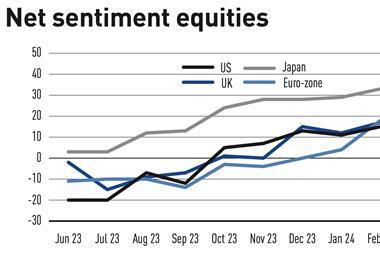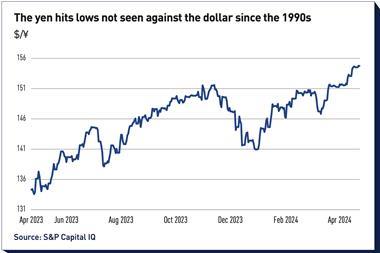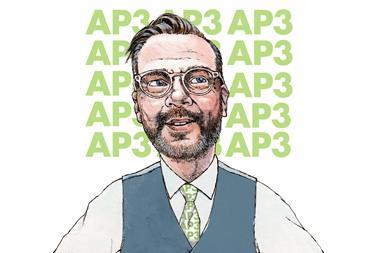The Belgian government’s announce-ment last month that its national telecoms operator, Belgacom, would be the subject of an IPO in 2004 was a long time coming. The state is suffering from a large deficit, and the money that could be raised from the sale of its remaining 50% stake in Belgacom would provide welcome relief. But there was always one issue standing in the way of attracting investors said analysts – the E3.6bn pension fund, and its E5bn of liabilities. The government took heed, and announced in a joint statement with Belgacom that the pension fund obligations for the company’s current and former statutory employees would be transferred to the state by the beginning of next year. In order to finance the E5bn of liabilities, the assets of Belgacom’s pension fund will therefore have to be liquidated before the end of 2003, and the E1.4bn difference will be financed through “borrowings with minimal impact on the company’s strength.” Current and future retirees, therefore, will see no impact, the effects on Belgacom will be limited, and the government will have money to put into its social security reserve fund, and achieve a good price for its 50% stake. Yet, while the move can only be regarded as sensible, and necessary, the return of the pension fund to the state after just eight years of being established has not pleased everyone, and it has raised questions about the future of Belgium pension system.
For the 10 fund managers of the Belgacom scheme, the disadvantages are obvious. With assets to be liquidated by the end of the year, Barclays Global Investors, Capital International, Fortis Investments, Goldman Sachs Asset Management International, LaSalle Investment Management, Lombard Odier Darier Hentsch, Putnam Investments, State Street Global Advisors, Wellington Management Co. and BlackRock, the fund’s managers will all lose their mandates. Similarly, the four fund managers appointed at the end of July to run a diversified international equity portfolio – Invesco Benelux SA, MFS International Limited, Alliance Capital Management LP and Morgan Stanley Investment Management – will not even see the assets they were appointed to run – assets that were supposed to come from “future contributions or a reallocation of assets to be decided by the board”. Understandably the general feeling among the managers is one of disappointment. Yet, even in spite of the time wasted or costs incurred, or mandates now terminated, fund managers are decidedly calm. The chance of an IPO of Belgacom had always been there, and the future of the underfunded pension scheme had also been uncertain. Says David Mace of MFS International UK: “Of course we are disappointed, but if you’d done your homework you knew that there could be a flotation, so the pension fund was at risk. It would have been more disappointing if we were not aware of what was going on at Belgacom.” Both Jan Verbrugge of Fortis Investments and Benoit Fally, managing director of State Street Global Advisors Belgium both agree.
If all managers were therefore aware of the risks involved, then it would be fair to say that there is little to complain about, but some onlookers question Belgacom and the state’s handling of the matter. The fact is that, yes, everyone in the market was aware the pension fund was likely to be liquidated and returned to the state, but neither Belgacom nor the state ever actually discussed the issue formally. Fally’s story is, for example, an intriguing one. “We’ve been a manager of Belgacom from the very beginning – when they created the pension plan we were part of group of seven hired back in 1996, and have maintained excellent relationships all the way through. It was made clear over the last year that the pension plan might disappear, so although we were not 100% sure, we knew there was a 50% chance that the pension fund could go back to the Belgian state. But we had not been forewarned officially – no one at Belgacom ever said specifically for fear that their managers could neglect their responsibilities – which would not have happened. It was rather rumours from the press that gave us the news that there was a 50% chance of this happening.” The first the fund managers formally knew of the selling off of assets, and the timetable for the liquidation was when Belgacom and the state made a public announcement.
Karel Stroobants, former president of the Belgian Pension Fund Association, believes it to be bad governance. “By carrying on as normal, employing an investment strategy, appointing managers as little as two to three months ago, Belgacom and the state have effectively put up a smoke screen hiding what is really going on behind the scenes.” It also seems somewhat unfair that the two parties allowed fund managers and other market participants to piece together what was going to happen to the fund from rumours in the press. The future of telecoms operator and its fund has been dissected for as long as two years in national newspapers. If the future was really decided as long ago as that, then it seems yet more unfair that those involved were not formally informed. One could also question an investment strategy based on a long-term horizon when those in the know were aware this horizon was actually only up to three years – particularly as the scheme in question is underfunded.
The return of the pension fund to the state is also being frowned upon in terms of broader effects on the Belgian pensions market. The Belgacom fund is the largest in the country, and its loss will be felt. Taking the fund back to the state, after creating the independent scheme only eight years ago raises questions about the future of Belgium’s pension system. Says Fally: “From a philosophical point of view, taking on the assets and liabilities of Belgacom’s pension fund goes against the trend – which is to create funded pension schemes across Europe – so from that point of view this decision is going against the tide.” Stroobants also questions the future of similar semi-state schemes, of which, he says, there are many. His argument is that if the government is prepared to take over Belgacom’s assets and liabilities, then it would be better practice to do so for all the funds if it is a matter of a failure of the scheme. If they do not, says Stroobants, then it is clear that Belgacom’s fund is being taken back purely for opportunistic reasons – to fill the state deficit.
All of the assets of Belgacom’s pension fund will go into the Belgian social security buffer fund, otherwise known as the Silver Fund, and the future here is being discussed. There are presently some three or four billion euros in the buffer fund, which invests solely in Belgian government bonds. This is expected to grow to as much as E100bn in 30 years time, and some asset managers are hopeful that the government may agree to relax the investment restrictions and therefore open up the fund to be managed by private managers. Says Fally: “We hope that Belgium will follow Sweden’s example of the AP funds or the French fonds des reserves de retraite which have been very professional.”
Here though, some think that fund managers will once more be disappointed. Says one senior Belgian pensions expert: “While it makes sense from an economic point of view, it would be a very difficult and political decision. As long as national debt continues to be such a problem for Belgium, then opening up the Silver Fund will never be an option. By investing the Silver Fund in its own bonds, the government is able to consolidate its debt.”
So the future of the Belgian pensions market looks uncertain. While the loss of the Belgacom pension fund may not have effects on the market, as it is only E3.6bn in size, and fund managers, having been aware of the possibility of a liquidation of assets, the move has thrown the Belgian pension system into the limelight, and raised questions as to its future. “We need a fundamental solution,” says Stroobants, who criticises the government for its “lack of vision”. With the reduction of national debt so high on the Belgium government’s agenda, however, re-assessing the pensions system may be some time in coming.












No comments yet